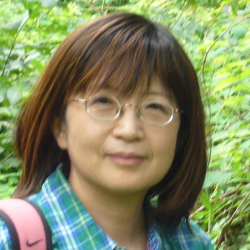2023 Candidate Yude Pan

Yude Pan
Research Scientist
USDA Forest Service
Candidate for: Member of the Governing Board
I am a distinguished research scientist associated with the unit of Climate, Fire and Carbon Cycle Sciences, Northern Research Station of the Forest Service. My research topics are primarily focused on forest responses to multiple environmental stresses and changing climate, global forest carbon budgets and forest carbon management for climate mitigation. I have a multidisciplinary education and training: I received my B.S. degree in Mathematics at the Oceanography University of China, my M.S. degree specializing in Quantitative Plant Ecology at the Graduate School of the Chinese Academy of Sciences, and my PhD degree in Plant Ecology at SUNY-ESF. I did my postdoc at the Ecosystem Center of the Marine Biological Laboratory in Woods Hole, MA, where I worked with process-based ecosystem models for estimating carbon and nitrogen fluxes and pools for terrestrial ecosystems.
More recently I was Visiting Research Scholar at Princeton University (2007), and Bullard Fellow at Harvard Forest (2016). For ESA, I served as Chair of the Asian Section (2008-2011), ESA Council Member (2008-2011), and board member of the International Relations Committee of ESA (1999-2001). I was elected ESA Fellow in 2020. I have been the subject-matter editor for Ecosphere, Ecological Applications, and Ecological Monographs since 2010. Besides, I was an Associate Editor for Biogeosciences from 2013 to 2021.
I am Advisory board member, International Tree Mortality Network of IUFRO; and was member of the Carbon Cycle Scientific Steering Group, United States Carbon Cycle Science Program; member of the Climate Societal Benefit Area team, the 2nd national Earth Observations Assessment; member of the Global Forest Expert Panel of FAO on Biodiversity, Forest Management and REDD+; Executive Committee and Coordinator of North America for the IUFRO Forest Landscape Ecology Working Group; and a few others. I have also served as an organizer/monitor for numerous workshops/seminars, panelist for various proposals, adjunct university professorships, and committee/advisor for several Ph.D. students.
What interests, experience or skills would you bring to this position?
Since receiving my PhD, I have had a successful career in both private and public institutions and unique experiences for relating advanced scientific research methods to contemporary issues such as climate change and mitigation. Through my career I have gained a broad range of skills relevant to scientific research and activities, for instance, publishing interdisciplinary research articles in influential journals such as Science and Nature; leading collaborative projects with domestic scientists across agencies and institutions or groups of international scientists for special studies; being PI/Co-PI of proposals for acquiring research grants (e.g. several successfully funded projects by NASA); mentoring students and young scientists; serving on scientific committees and panels, serving editorial posts for journals and special issues, organizing workshops and seminars, and so on. At my present career stage, I hope to do more community services and engage in more leadership roles for helping younger generations of ecologists cultivate their talents, make successful careers, and contribute their learning to protecting our planet earth and serving humanity.
How would you support ESA’s mission? How would you plan to promote DEIJ in ESA membership and activities if elected?
As an Asian female scientist who came to the US pursuing study and career development, I have experienced many disadvantages that could have easily suffocated my career aspiration. There are not only stereotype views towards Asian females, but our skills and capabilities are often underestimated, and we are also sometimes treated with ignorance and unfairness. I have seen many talented Asian female students abandon their dreams and give up a promising scientific career, and I observe very few Asian female scientists who have been recruited to leadership positions including this ESA’s governing board. As the ESA strives towards Diversity, Equity, Inclusion and Justice in our society, my career experiences and accomplishments may make me an inspirational representative for ecologists with similar cultural backgrounds. The reality is that there is an increasing number of Asian students in the ESA, increasing publications in and accessibility to the ESA journals by Asian scientists both domestically and globally, as well as an active Asian Section within the ESA. Thus, the ESA board would benefit from having a member who can provide guidance and reassurance for Asian, particularly female, students and scientists in career development and free thinking, encouraging their contributions to ecology and especially in Asian regions, where they may have special connections and expertise. I can use my knowledge and cultural understanding to network this group of ecologists, promoting the ESA’s mission of DEIJ and assisting Asian ecologists to becoming valuable assets to the ESA!